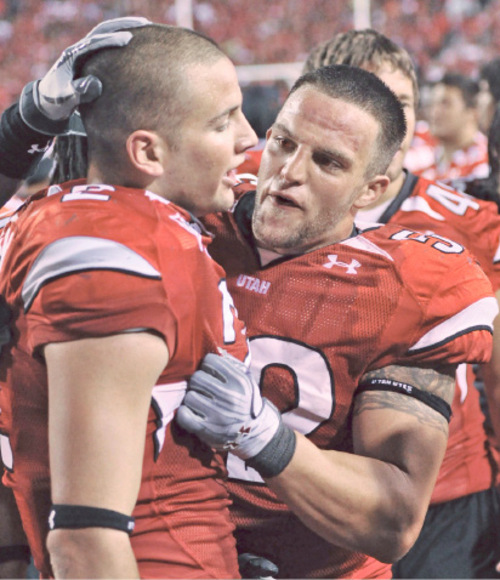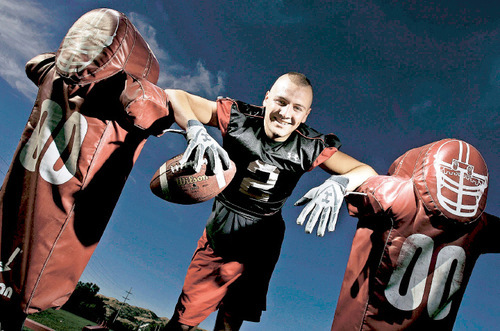This is an archived article that was published on sltrib.com in 2010, and information in the article may be outdated. It is provided only for personal research purposes and may not be reprinted.
Brian Blechen will turn 19 only next week, after starting his fourth game as Utah's strong safety.
"It takes a mature 18-year-old to do what he's done," said his father, Robert Blechen.
Yet that's not even close to the most impressive age-related achievement for a football player in his family.
This discovery of yet another quarterback who's making an impact for the Utes defensively comes complete with the story of Blechen's grandfather, who played semipro football in Southern California until he was 67. Even now, as he nears his 75th birthday, with both knees having been replaced, Bob Blechen says a comeback is "tempting."
Mix in a father and older brother who were known for their hard-hitting approaches and the portrait emerges of a natural defensive player who marketed himself as a college QB prospect, but must have known where he truly belonged.
Brian Blechen may miss quarterbacking, but this response to why he likes football says everything about his game: "I love just being able to hit people and not get in trouble for it."
Even beyond his game-changing interception against Pittsburgh, Blechen is establishing himself as a Ute fixture. He looks more imposing than his 6-foot-2, 203-pound listing suggests and makes plays all over the field.
How do the Utes do this? In the tradition of Paul Kruger, now a defensive end for the Baltimore Ravens, they have linebacker Chad Manis and Blechen as defensive stars who once were scholarship quarterbacks.
In the latest case, some research was involved. Once spring practice was over, Ute coach Kyle Whittingham thoroughly studied Blechen's high school videos. Just before Blechen left home in California to attend voluntary workouts in June, Whittingham called him with this instruction: "Quit throwing the ball and start backpedaling."
Good strategy. When practice began in August, Blechen almost immediately jumped to No. 1 on the depth chart, with Justin Taplin-Ross moving to free safety. "He's exceeded our expectations," Whittingham said.
His grandfather is pleased mostly that Brian's newfound fame is resulting in the correct, consistent pronunciation of the family name: It's Blechen, as in wreckin'.
While no one among the three generations of Robert Blechens who preceded Brian in football played at the highest collegiate level, the family history undoubtedly aided his development. The patriarch, known as Bob, was an offensive lineman for George Allen at Whittier College in the 1950s and was drafted by the Detroit Lions, but was cut in training camp. While working in computer science, he played semipro ball for more than four decades, eventually being featured in Sports Illustrated, a book titled Football America: Celebrating Our National Passion and an NFL Films production.
"I have an unusually high passion for football," said Bob Blechen, who still helps coach a high school team.
Grandfather on grandson: "He's far more athletic than I was."
Grandson on grandfather: "He's definitely a lot tougher."
Brian's father became a starting linebacker as a freshman at Claremont College. Having watched films of him, Brian said, "He loved to fly around, just hit." Robert Blechen gave up the sport after that season to fully pursue academics and is now a quality assurance manager for a company known for manufacturing space shuttle liquid-fueled rocket engines.
The rocket scientist would raise his own projectiles. Brian's older brother was an aggressive linebacker in high school. Brian was the one who combined all-around athletic ability — from his mother's side of the family, his grandfather says — with the football breeding to become a major college prospect.
On Saturday at New Mexico, Blechen assisted in tackles on each sideline on consecutive plays. He was demonstrating those traits at age 13. The Simi Valley Vikings, the youth team his father coached, won 24 straight games over two seasons, including 22 shutouts, with Brian playing quarterback and linebacker.
While attending Utah's summer camp during an audition that included diagramming plays on the board, Blechen committed to the Utes in June 2009. He then shared the quarterbacking job as a Moorpark High School senior, functioning mostly as a runner, while also playing safety.
As of late May, Blechen still figured he would play QB in college. His position switch required little persuasion from Whittingham, who could promise him a chance to play sooner on defense.
Not that either of them targeted the season opener, necessarily.
After Pitt rallied to force overtime, Blechen stepped in front of a receiver and intercepted a pass, ending the Panthers' OT possession and facilitating Utah's win. He was even more noticeable against UNLV and New Mexico, roaming the field to deflect passes and make tackles.
While Blechen professes humility — he's trying to "keep my head down, just do what I'm told," he said — Whittingham sees in Blechen the confidence of a young Eric Weddle, invoking the name of the former Utah star who's now the San Diego Chargers' free safety.
There may be more Weddle comparisons in Blechen's future; offensive coaches are eyeing him as the wildcat quarterback next year. So the Utes might get what they originally bargained for in Blechen, even if they're already very happy with how he turned out.
kkragthorpe@sltrib.com Twitter: tribkurt —
Brian Blechen file
• Born Sept. 30, 1991, during Monday Night Football.
• Grandfather, Bob Blechen, appeared in an NFL Films production as a semipro offensive lineman at age 61 and was brought in to address the Baltimore Ravens.
• Played at Moorpark High School, graduating five years after Ravens tight end Dennis Pitta, who played for BYU.
• Lettered in football, basketball, swimming (freestyle) and track (long jump) in high school.
• Tied for fifth among Utes with 17 tackles in three games.
• Mountain West Conference defensive player of the week after his college debut against Pittsburgh.





